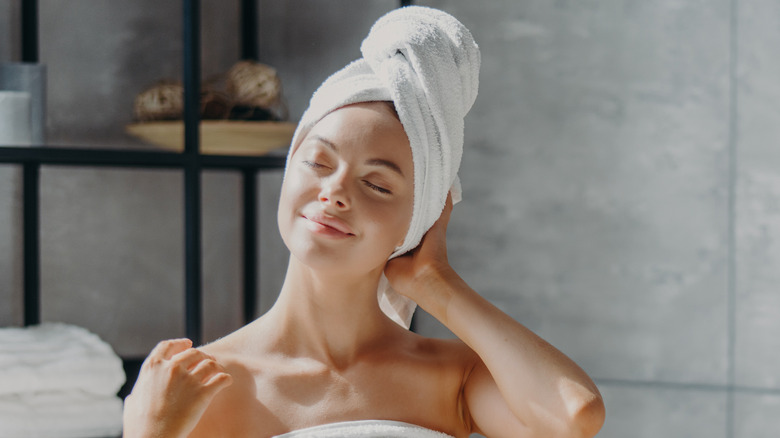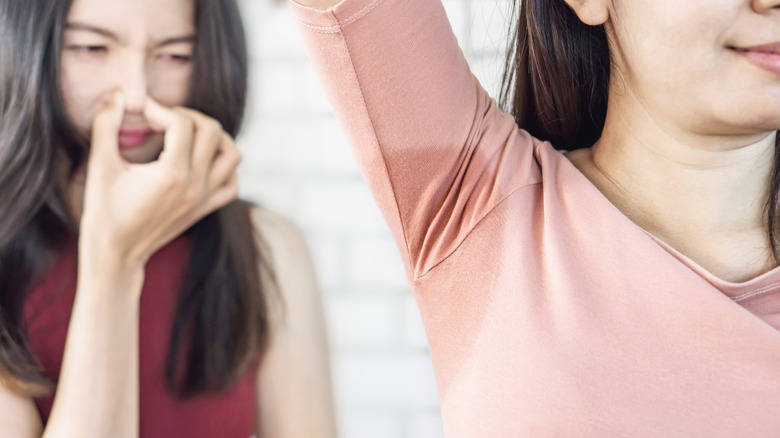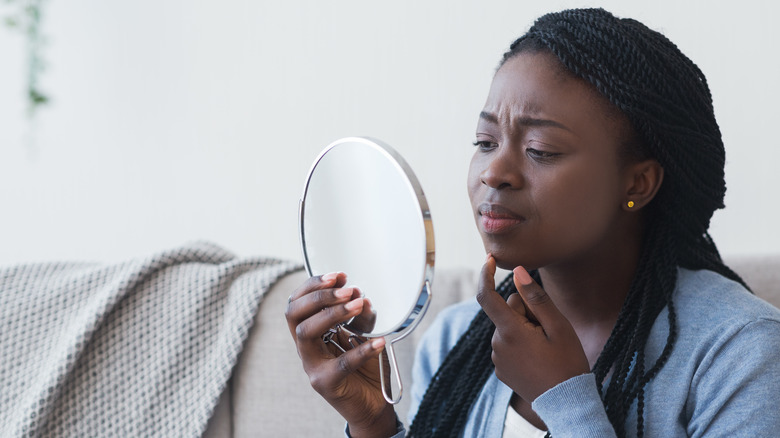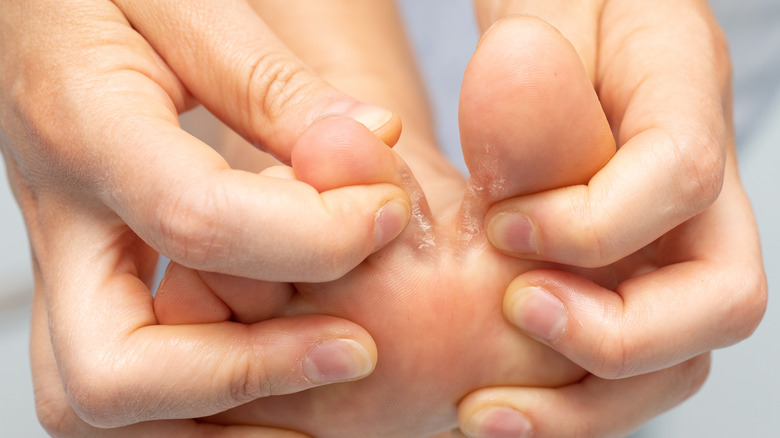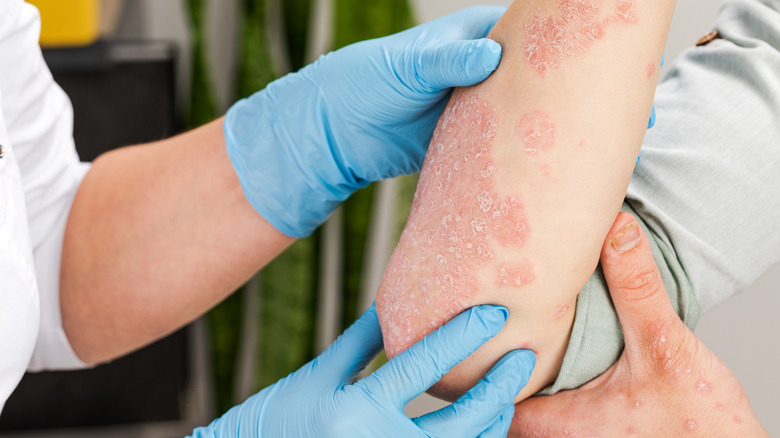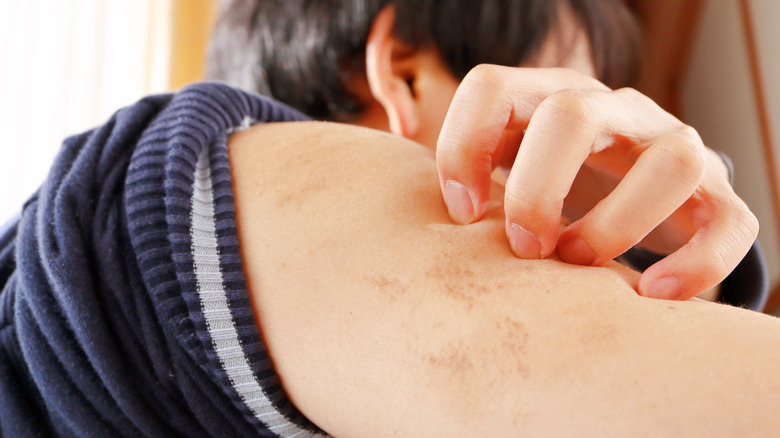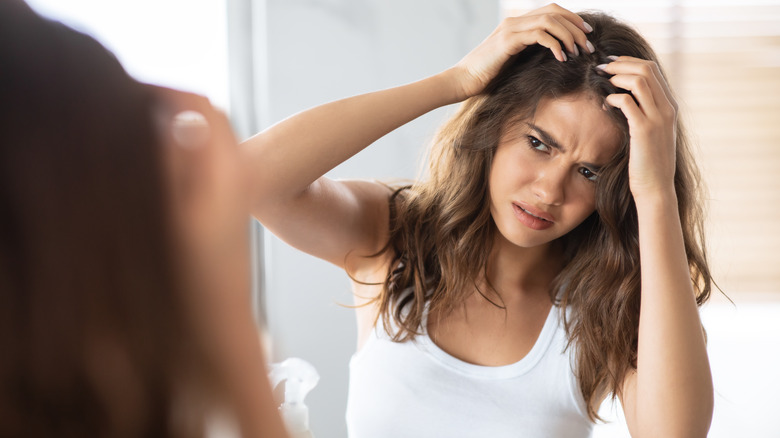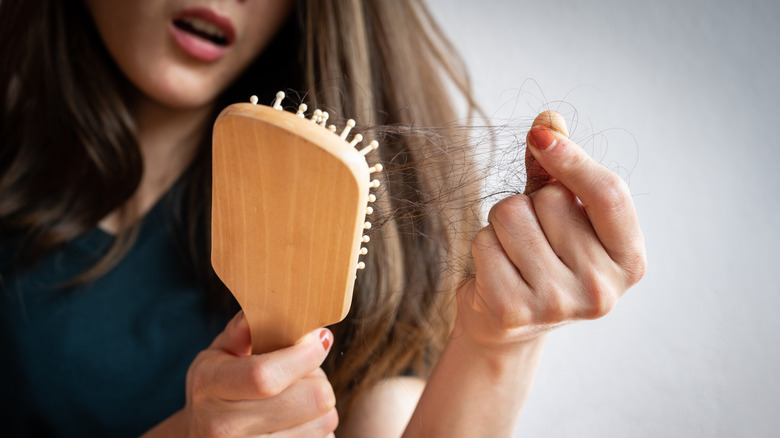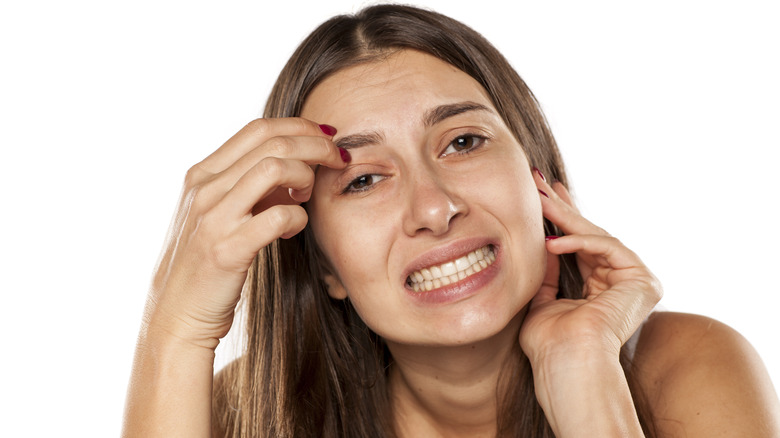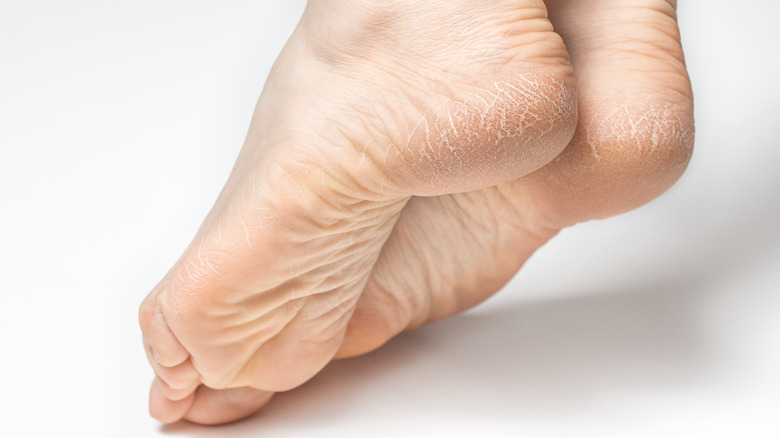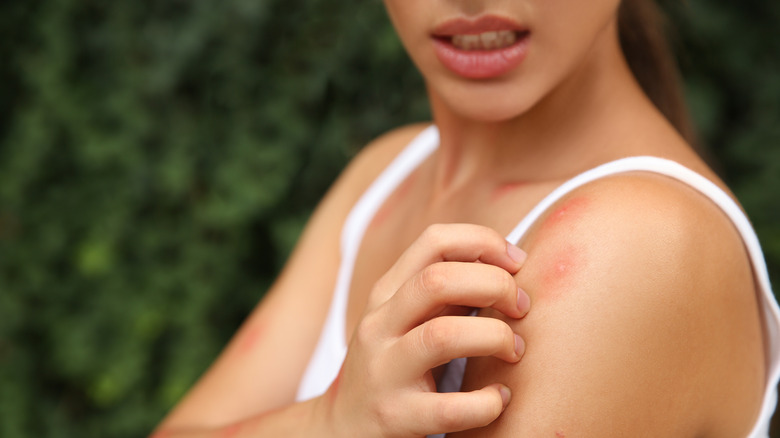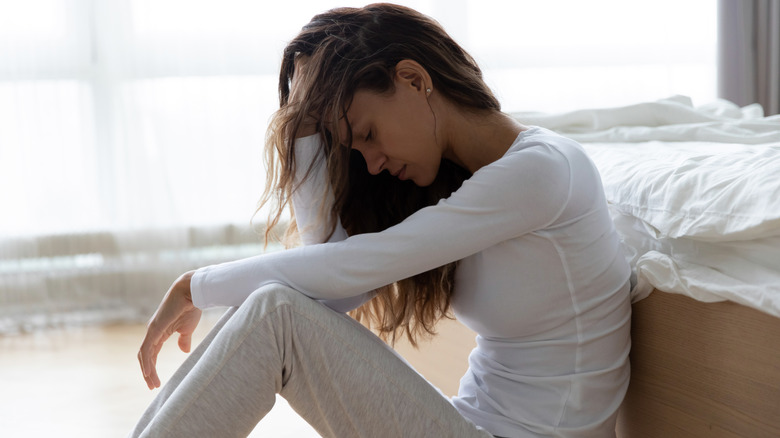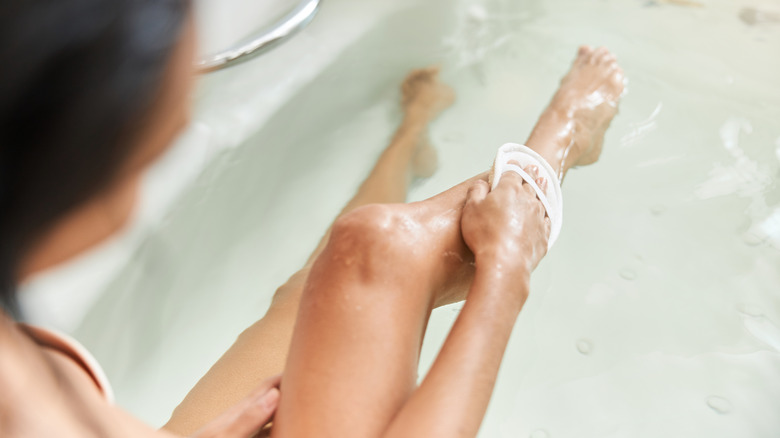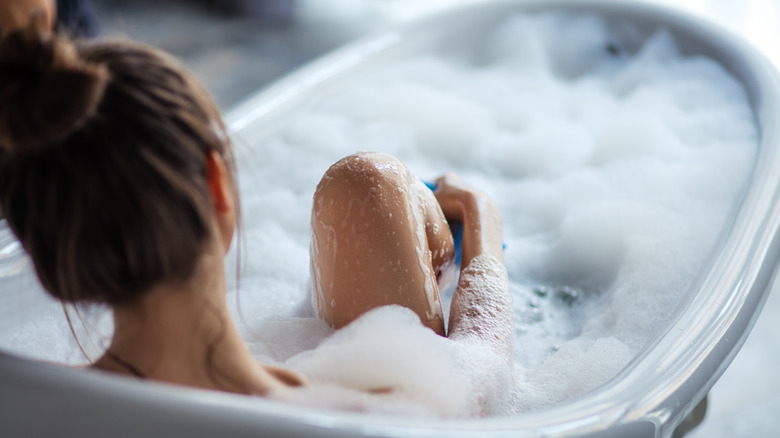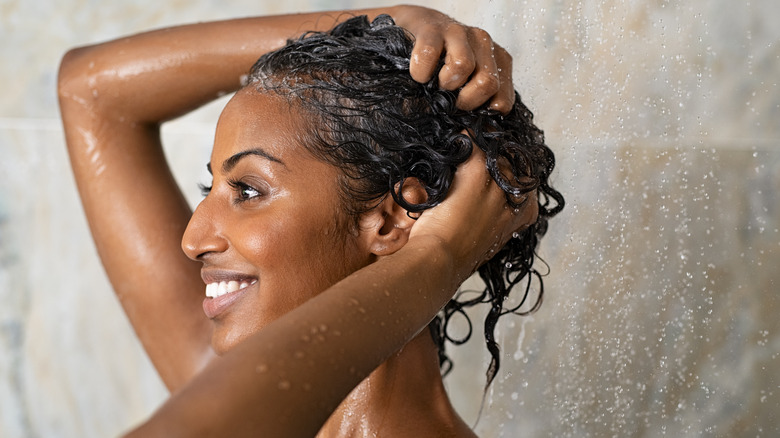Here's What Happens If You Stop Bathing For An Entire Year
Have you ever wondered what would happen if you gave up bathing entirely? During the pandemic, many of us stopped leaving the house as much as we were before, and for some, that also meant a change to hygiene practices (via The New York Times). "A lot of us are working from home, and may not be as diligent with showering or changing clothes as we may have been if we were going in to work," board-certified dermatologist Purvisha Patel told Well+Good. "We may also not be moving around as much as we used to and sitting more, and we may not following the cardinal rules for skin and body health."
While a 2021 survey by research firm YouGov found that many people still shower daily, some experts like Dr. Robert H. Shmerling for Harvard Health Publishing recommend showering less often to help protect the healthy bacteria that live on our skin. Showering less also means using less water, which is better for the environment, especially considering that the average American shower uses 2.1 gallons of water every minute (via Home Water Works).
If showering less than daily has benefits, what would happen if you were to stop bathing for an extended period of time? Are the benefits even greater or is there a point at which the disadvantages outweigh the benefits?
You'll start to smell bad
While some people claim that they've stopped bathing and don't smell, it may just be that they've stopped being able to smell themselves and their friends and loved ones are too nice to give them the hard truth. If you've heard that your body will eventually readjust once you stop showering and prevent its own odor, well, you may want to listen to what the experts have to say.
Dr. Rebecca Marcus, a dermatologist and founder of Maei MD, told The List, "In the short term [after not bathing], bacteria, dirt, and sebum (oil) will begin to accumulate on your skin and will likely cause an odor after a day or two, especially in areas that are prone to odor such as the axillae (armpits) and feet." While this odor begins fairly quickly, don't expect it to go away on its own.
Additionally, dermatologist Suzanne Friedler, told The List that because odor comes from bacteria, the longer you don't shower the longer that bacteria can continue to grow on the skin. And, you guessed it, that causes even more odor. "Areas that are particularly prone to get funky are the hot, sweaty parts of the body," she said.
You may get breakouts
Odor isn't the only concern when it comes to skipping bathing. While bathing too often — and particularly over-exfoliating — can cause skin breakouts to worsen, according to Healthline, not bathing at all is also a recipe for skin disaster. Dermatologist Rebecca Marcus told The List that the buildup of bacteria, dirt, and oil that causes odor can also clog your pores and cause acne breakouts.
Dr. Sheilagh Maguiness, a board-certified pediatric dermatologist, agreed, revealing, "The increased oil and bacteria can give rise to even more microbes on the skin (ones that are actually not welcome), and may alter the skin's natural microbiome." This, she said, can exacerbate existing skin conditions, like acne. As many of us well know, acne isn't just limited to your face, either. The oil, bacteria, and dead skin left on your body when you don't bathe can lead to acne on your chest, back, and as Verywell Health notes, even your butt.
You're at risk for fungal infections, cysts, and more
According to Dr. Rebecca Marcus, a dermatologist and founder of Maei MD, "Fungus and viruses will ... find an opportune environment in which to grow, leading to skin infections such as tinea pedis and warts." Tinea pedis, better known as athlete's foot, isn't directly caused by poor hygiene (it's a fungus, after all), but going an extended period of time without bathing allows the fungus to grow.
Dermatologist Suzanne Friedler also notes that cysts and yeast overgrowth can become issues without regular bathing. In particular, the underarm, groin, and other areas where your skin rubs together are at risk of these painful bumps and a couple of different types of yeast overgrowth. "One is caused by normal physiologic yeast on the skin, the other is caused by more pathologic yeast," she explained. "The longer you go without showering, the more likely you are to get the pathologic yeast growing, typically candida."
Your immune system might be triggered
If you have a skin condition like eczema, it may be your first instinct to reduce your bathing regularity in an effort to not dry out your skin, but this is actually the opposite of what you want to do. The National Eczema Association actually suggests bathing daily (at a minimum) along with moisturizing to help keep the skin hydrated. But dry skin isn't the only factor at play with eczema and related conditions.
According to dermatologist Sheilagh Maguiness, "Some of these mentioned conditions arise when excess bacteria on the skin cause an immune response in the person affected. Atopic dermatitis or eczema is a good example of this phenomenon, where overgrowth of bacteria on the skin arises due to defects in the skin barrier." This is in part because eczema already causes an overactive immune response, according to the National Eczema Association, so any additional bacteria or fungus that has built up from not bathing for an extended period of time can result in a flare.
Your skin may develop an itchy brown layer
One phenomenon you might encounter if you go an entire year without bathing is something called dermatitis neglecta, which is just what it sounds like: neglecting the skin. According to Healthline, dermatitis neglecta results when dead skin cells and grime create a brown, scaly layer on your skin due to a lack of washing. The treatment is usually simple: wash your skin. In some cases, however, the removal of the scaly layer may require the use of over-the-counter products like salicylic acid or glycolic acid (via Medical News Today).
Even if you don't develop something as severe as dermatitis neglecta, dermatologist Sheilagh Maguiness cautions that there's another condition that may result from not bathing. "In some areas the dead skin cells will build up into a dusky brown layer, common on the neck, underarms and groin and called retention hyperkeratosis," she warned. "This can get very itchy."
Dandruff will accumulate
While a buildup of sebum and skin cells on the body can result from not bathing for an extended period of time, that's not the only place you'll see issues arise. According to dermatologist Rebecca Marcus, "Hair will accumulate oil as well, and this will lead to an unpleasant odor and potentially itching. An excess of oil or overgrowth of fungus on the scalp may lead to inflammation and a condition known as seborrheic dermatitis, [also known as] dandruff."
Dermatologist Suzanne Friedler agrees, adding that the natural shedding of skin is facilitated by bathing whereas not bathing actually impairs some of that skin turnover. "It can cause dandruff," she said. "Your skin is going to start to get red and flaky. That red, flaky skin can be itchy and can be uncomfortable."
While you may not see dandruff immediately after stopping bathing, you're almost guaranteed to see it eventually. Dr. Friedler cautioned, "Some people can go only a couple of days without washing their hair, some people can go a couple of weeks. Other people can go over a month. But most people who haven't washed their hair in a month, they're going to get red and flaky."
Your hair may start to fall out
If dandruff doesn't seem like that big of a deal to you, it's important to know that dandruff that results from not bathing can get much worse than just a few itchy flakes here and there. Dermatologist Suzanne Friedler told The List, "You could also get hair loss over many, many months of not washing your hair. As dandruff starts to get severe, sometimes that inflammation will start to cause hair loss as well."
This is in part due to the scratching associated with dandruff, which can start to damage the hair follicles, but it may also be the case that what you think is dandruff is actually scalp buildup. According to Healthline, scalp buildup results from things like hair products, sweat, and dead skin that can also cause flakes. In addition to flakes, buildup over time (like after a year of not bathing, for instance) can actually clog your hair follicles, resulting in hair loss.
You could get dandruff other places than your scalp
While dandruff on your scalp can be annoying, it isn't the only place the red, itchy flakes might appear. According to dermatologist Suzanne Friedler, seborrheic dermatitis is accelerated by the growth of yeast on your skin and can develop "in your nose, inside your ears, down the chest in that hairy region for men, and in the eyebrows." In babies, this is referred to as cradle cap, but it can also occur in adults.
To help combat seborrheic dermatitis, the Mayo Clinic recommends daily bathing with a gentle cleanser, so needless to say going an entire year without bathing isn't going to be doing your skin any favors when it comes to this condition. In some cases, you may also need special shampoos or medications to help treat the condition, so keeping it under control in the first place, when at all possible, is a good idea.
Your skin might develop painful cracks
Even if you aren't particularly prone to skin conditions, going an extended period of time without bathing can still do quite a number on your body. Dermatologist Suzanne Friedler told The List, "After many months of not bathing regularly you'd have a buildup of dead skin cells and brown, clumpy skin. You would probably get cracks and fissures of your skin as well because the bacteria and other things on your skin would lead to skin infections."
According to Medical News Today, skin fissures can have many causes, but eczema, athlete's foot, and a buildup of skin (all of which can be exacerbated by not bathing regularly) are among the causes. Skin fissures can be very painful, bleed, and lead to more severe conditions like skin ulcers. While excessive washing can dry out your skin and make skin fissures worse, daily bathing is safe for most people.
You'll become more prone to infections
While some bacteria and types of fungus are always present to some degree on our skin, not bathing for an extended period of time results in overgrowth that can throw things off balance pretty drastically. One bacterium that is particularly dangerous in the case of overgrowth is staphylococcus aureus. If it is present on your skin in abundance and then you develop a rash, bug bite, or any other injury that results in a break in the skin, you're looking at delayed healing time at a minimum. In severe cases, bacteria can enter the bloodstream and cause potentially deadly staph infections.
In addition to these ever-present bacteria, yeast, and fungus on our skin, not showering also allows all the other types of germs we pick up in the course of a day to remain on our skin and start to grow. Think about it: If washing your hands is important for avoiding getting sick with a cold, flu, or coronavirus, washing your body is also important, even if it doesn't come into contact with as many surfaces.
Social isolation is likely
While there are many repercussions to your physical health if you stop bathing for an entire year, there are also likely repercussions to your mental health. Dr. Rebecca Marcus, a dermatologist and founder of Maei MD, pointed out to The List that failing to bathe regularly not only increases the risk of infection, but also social isolation. We won't sugarcoat it: If you aren't bathing for months at a time, chances are you're going to be emitting an off-putting odor, at minimum, making people not want to hang around you. Even if the odor isn't the problem, the various conditions we've described that can be exacerbated by not bathing may make it hard to get out and meet new people.
According to a 2019 report by the American Psychological Association, social isolation and loneliness are already on the rise and are associated with both physical and mental health risks. If you decide to go an extended period of time without bathing, that social isolation will likely only increase the longer you eschew the shower or bath, especially after a year.
It will take some elbow grease to get clean again
If you do decide to go an extended period without washing your skin and hair you are going to have to work hard to get them clean once you do finally bathe. After all, we're talking a whole year's worth of sweat, oil, environmental pollutants, and grime. You may even need to bathe multiple times before you're truly clean again — particularly if you want to avoid a lot of scrubbing or harsh cleansers in the process.
According to dermatologist and founder of Maei MD, Dr. Rebecca Marcus, "It may take a while to get clean once you do decide to start bathing again." She continued, telling The List, "Dead skin cells mixed with oil and dirt will have built up on the skin, creating yellow [and] brown bumps that take time and a lot of elbow grease to remove."
You probably need to bathe more often than you think
All of the dermatologists we spoke to agreed that there's no evidence-based benefit to going a long time without bathing, but the ideal regularity differs. Dermatologist Suzanne Friedler said that a number of factors come into play, including where you live, how active you are, and the time of year. "If you go to the gym and sweat every day, you're going to have much more of a buildup of bacteria and yeast," she explained. "If you're someone who leads a fairly sedentary lifestyle, your skin is fairly dry, or you live in a cool climate, every few days may be okay for you."
Dr. Rebecca Marcus agrees. As she explained, "For those with dry skin and eczema, it may not be necessary to shower every single day and they could potentially skip a day here and there if frequent showers are contributing to their dry skin. Ideally, though, showers should be daily, and should be kept short and taken with lukewarm, not hot, water to prevent excessive drying of the skin."
You may need a special kind of cleanser
If after an extended period of time of not bathing, you're finding it difficult to get your skin back to tip-top condition, it may be the type of soap you're using. "It is very important to state here that what you use as a cleanser will impact the health of your skin," said Dr. Sheilagh Maguiness, a board-certified pediatric dermatologist. "You want to remove dead skin, dirt, and bacteria while not disrupting your natural skin microbiome." Dr. Maguiness recommends a gentle, hypoallergenic cleanser that is pH balanced for the skin and dermatologist-recommended.
Dermatologist Suzanne Friedler also noted that certain skin conditions might require specific types of cleansers. She clarified, saying, "If someone comes in complaining of odor, an antibacterial soap is great for that. If someone comes in for yeast, you need sulfur washes and other antimicrobial washes that are appropriate, [like] anti-fungal creams and washes. Even dandruff shampoos can be helpful for some of those yeast-borne infections."
